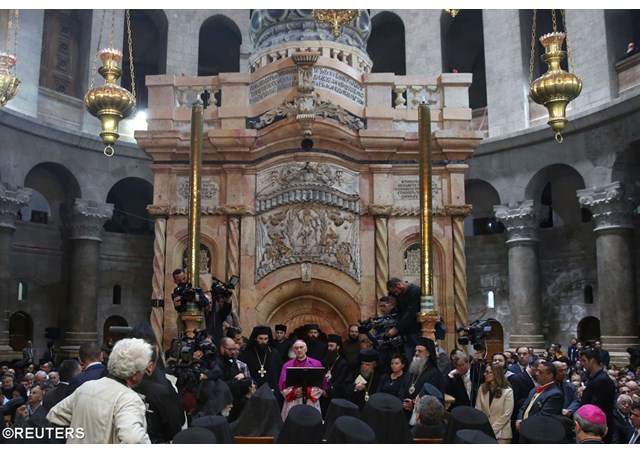
Growing cooperation among Christian Churches in Jerusalem

(Vatican Radio) The recent rededication of the ‘Edicule’, or chapel surrounding Jesus’ tomb in Jerusalem’s Basilica of the Holy Sepulchre, is an important sign of the growing cooperation among the different Christian Churches in the Holy Land
That’s the view of Belgian Father Frans Bowen, a Missionary of Africa who has been living in Jerusalem for almost 50 years. He works closely with the Vatican as a member of the joint international commissions for dialogue with both the Orthodox and the Oriental Orthodox Churches.
During a visit to Jerusalem with the Tantur Ecumenical Institute last week, Philippa Hitchen, spoke to Fr Frans about the complex relationships among Christians in the land where Christ was born….
Fr Frans explains that in Jerusalem the three most visible communities are the Greek Orthodox, the Latin, (or Roman Catholic) and the Armenian patriarchates. These communities are the principle groups included in the ‘Status Quo’ which regulates custody of the main Christian sites (the Latin Patriarchate is represented by the Franciscan Custody of the Holy Land).
Alongside those, there are the Oriental Orthodox Churches, the Copts, Syrians and Ethiopians who have small communities, as well as the Oriental Catholic Churches, that is Greek Catholic, Maronite, Syrian and Armenian Catholics.
There is also an Anglican and a Lutheran bishop in Jerusalem, plus many smaller Pentecostal and Evangelical communities, but Fr Frans says the 12 main Churches with episcopal structures now meet regularly and have developed a closer collaboration over recent decades.
Papal visits change atmosphere
While pilgrims may take home a picture of tensions among the Churches, Fr Frans says this is something that tour guides often repeat, but does not reflect the current state of relationships. “The atmosphere here started changing with the visit of Pope Paul VI,” he recalls, in particular his encounter with the Patriarch of Jerusalem Benedictos, “because for the first time the Greek Patriarchate felt recognized” and could start developing relations with others.
In the 1990s, Fr Frans continues, during the political difficulties of the intifada the heads of Churches “felt the need to consult and see what they could say and do to together”. Since then, they have met regularly, publishing common messages for Christmas and Easter and common statements when the situation requires.
Personal relations overcome fear
The recent ecumenical rededication of the ’Edicule' or chapel housing Jesus' tomb inside the Basilica of the Holy Sepulchre was an important development since it took almost 20 years for the Churches to come to an agreement. Little by little things change, Fr Frans says, and “personal relationships play an important role”. Restoration is also underway at the Basilica of the Nativity in Bethlehem, a project that “had been waiting for centuries”. Quoting the words of Pope Francis, he says “we’ll continue walking together” and “that’s how we make unity”.
Reflecting on Pope Francis’ 2014 visit to the Holy Land, Fr Frans says it had a profound impact, as can be seen from statements of the Greek Orthodox Patriarch who “spoke about dialogue as he never did before”. There is still a lot of fear and prejudice, he notes, but “personal meetings are able to change a lot”.
| All the contents on this site are copyrighted ©. |


